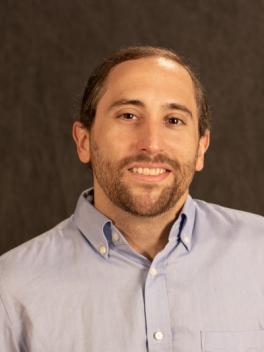Mike Vuolo, Professor
In this feature, we get to know Professor Mike Vuolo. Dr. Vuolo has been with our department since 2015 and was promoted to full professor in 2023.

Where did you grow up?
New Haven, Connecticut. No relation to Yale. In fact, I’m first-gen.
How long have you been at Ohio State?
10 years.
How did you become interested in sociology?
As far as selecting a major, I was motivated by viewing the War on Drugs in my hometown, and sociology (and political science) felt like the best majors to study that. As far as grad school, it was a professor at my undergrad institution (Brad Wright at UConn) who convinced me that grad school was the way to go. His mentorship was instrumental to my success as a first-gen student and why I picked this as a career.
What do you study?
Broadly, I study crime, law and deviance; health; work; and statistics and methodology. Within that, I study how social contexts (e.g., policy, subculture) affect substance use outcomes, the effect of criminal records on employment, and life course transitions.
What projects are you working on currently? Can you share any interesting or unexpected findings?
1. NIH R01 Grant on Disasters & Substance Use
- Focus: Examining the impact of disasters on substance use, dependence, treatment and mortality.
- Status: Early stages; working on converting FEMA disaster data.
- Key Findings: Thus far, key findings suggest there is no link between naloxone access laws and overdose risk. Additionally, prescription drug monitoring programs help reduce prescription drug overdoses, and psychoactive drugs contribute to deaths beyond overdose statistics.
2. EU Funded Study on Substance Use in Croatian Nightlife
- Focus: Investigating substance use in Croatian nightlife.
- Status: This project is in the early stages, building on prior research in Croatia and work on prescription drug misuse in nightlife. This project notably includes partnerships with French colleagues on drug treatment populations.
3. Employment and Criminal Records
- Focus: How criminal records impact job applications, particularly due to background check questions.
- Key Findings: Individuals with criminal records are less likely to apply for jobs with background checks due to anticipated stigma and drug testing.
- Next Steps: I am currently developing a new grant proposal on the intersection of criminal records, substance use and employment.
4. Substance Use Policy and Life Course
- Focus: Studying the effects of tobacco, cannabis and e-cigarette policies across the life course.
- Status: I am nearing completion of a large grant on e-cigarette and tobacco policies.
5. The Criminalization of Cannabis (1885-1940)
- Focus: Analyzing the criminalization of cannabis through 10,000+ newspaper articles.
- Key Findings: Racial/ethnic minorities were demonized, influencing state-level cannabis criminalization. Mexican populations were particularly targeted in policy adoption.
- Status: Ongoing research with a recent publication in Social Problems.
What classes do you teach?
At the graduate level, Categorical Data Analysis. At the undergraduate level, Research Methods, Drugs and Society, and Criminology.
Any upcoming travel?
Next for sure trip is the International Sociological Association meetings in Rabat, Morocco.
How would you describe Ohio State's Department of Sociology?
I always tell people two things about Ohio State Sociology. First, in 10 years, I’ve had all but 2 grad student cohorts in my class. So having experience with nearly all of them, I’m always continually impressed. They are a major part of the strength of our department. I feel lucky to have gotten to work with many of them more closely. Second, all my colleagues are incredibly research active. And that creates an exciting and robust environment for research for everyone.

